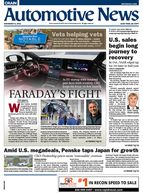For all of Faraday's past ambitions, Breitfeld understands there's only one thing that matters at this point.
"I'm stepping the brake on all these advanced things," he said, "and focusing the whole company right now on getting the product out. This is challenging. It can be done."
Faraday Future, which counts Chinese automaker Geely as an investor, ranked 11th out of 20 EV startup entrants analyzed by consulting firm Guidehouse Insights in a July 2020 report. The report measured the companies on everything from partners to geographic reach to go-to-market strategy.
Finding success in that crowded field will require Faraday Future to walk a tightrope: Rebuild a staff decimated by departures and layoffs, build a brand from scratch and ensure the facility becomes an up-and-running factory within the next seven months.
In September, the company added a fresh round of senior executives, including Vice President of Manufacturing Matt Tall, who came to Faraday from Rivian, as well as others who arrived from EV upstarts such as Lordstown Motors and Karma Automotive.
"You need a company where you have the right technology and product ideas in place, and that's all a given here," Breitfeld said. "The market and product was here. What was not here was a team that could really execute."
Last week, the executive ranks churned again. Faraday announced CFO Zvi Glasman, who arrived only 10 months ago, had resigned. He was replaced by Chuck McBride, a public company veteran who has worked in multiple industries.
Faraday says it has 300 employees. Roughly a third have joined since the company's July public offering. At its peak, Faraday had approximately 1,500 employees.
The J Capital report said staffing was "way below" needed levels and that the automaker would need a minimum of 1,200 engineers to produce the FF 91 and the more mass-market FF 81 sedan, scheduled to follow in early 2023. Perhaps a fix is on the way: This week, Faraday is set to hold a job fair in Hanford to begin hiring factory employees.
Will customers want the vehicles those workers ostensibly are going to build? The J Capital report said, "there isn't much demand for the car" and suggested the market in the U.S. and China for $180,000 electric vehicles — the target price Faraday envisions — is thin.
That'd be the high end of luxury EVs. For comparison, the Lucid Air costs $77,400 to start and runs to $169,000 with its Dream Edition Range, which gets more than 500 miles of range per charge. A Tesla Model S starts at $91,000, and its Long Range trim runs $131,190.









